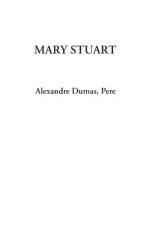Argyll saw that the whole day’s struggle would be concentrated there, and, understanding more and more the importance of the village, immediately put himself at the head of the body of his army, commanding a rearguard of two thousand men to remain there and await further orders to take part in the fighting. But whether the captain who commanded them had ill understood, or whether he was eager to distinguish himself in the eyes of the queen, scarcely had Argyll vanished into the ravine, at the end of which the struggle had already commenced between Kirkcaldy of Grange and Morton on the one side, and on the other between Arbroath and Seyton, than, without regarding the cries of Mary Stuart, he set off in his turn at a gallop, leaving the queen without other guard than the little escort of twenty men which Douglas had chosen for her. Douglas sighed.
“Alas!” said the queen, hearing him, “I am not a soldier, but there it seems to me is a battle very badly begun.”
“What is to be done?” replied Douglas. “We are every one of us infatuated, from first to last, and all these men are behaving to-day like madmen or children.”
“Victory! victory!” said the queen; “the enemy is retreating, fighting. I see the banners of Seyton and Arbroath floating near the first houses in the village. Oh! my brave lords,” cried she, clapping her hands. “Victory! victory!”
But she stopped suddenly on perceiving a body of the enemy’s army advancing to charge the victors in flank.
“It is nothing, it is nothing,” said Douglas; “so long as there is only cavalry we have nothing much to fear, and besides the Earl of Argyll will fall in in time to aid them.”
“George,” said Little William.
“Well?” asked Douglas.
“Don’t you see?” the child went on, stretching out his arms towards the enemy’s force, which was coming on at a gallop.
“What?”
“Each horseman carries a footman armed with an arquebuse behind him, so that the troop is twice as numerous as it appears.”
“That’s true; upon my soul, the child has good sight. Let someone go at once full gallop and take news of this to the Earl or Argyll.”
“I! I!” cried Little William. “I saw them first; it is my right to bear the tidings.”
“Go, then, my child,” said Douglas; “and may God preserve thee!”
The child flew, quick as lightning, not hearing or feigning not to hear the queen, who was recalling him. He was seen to cross the gorge and plunge into the hollow road at the moment when Argyll was debouching at the end and coming to the aid of Seyton and Arbroath. Meanwhile, the enemy’s detachment had dismounted its infantry, which, immediately formed up, was scattering on the sides of the ravine by paths impracticable for horses.
“William will come too late!” cried Douglas, “or even, should he arrive in time, the news is now useless to them. Oh madmen, madmen that we are! This is how we have always lost all our battles!”




